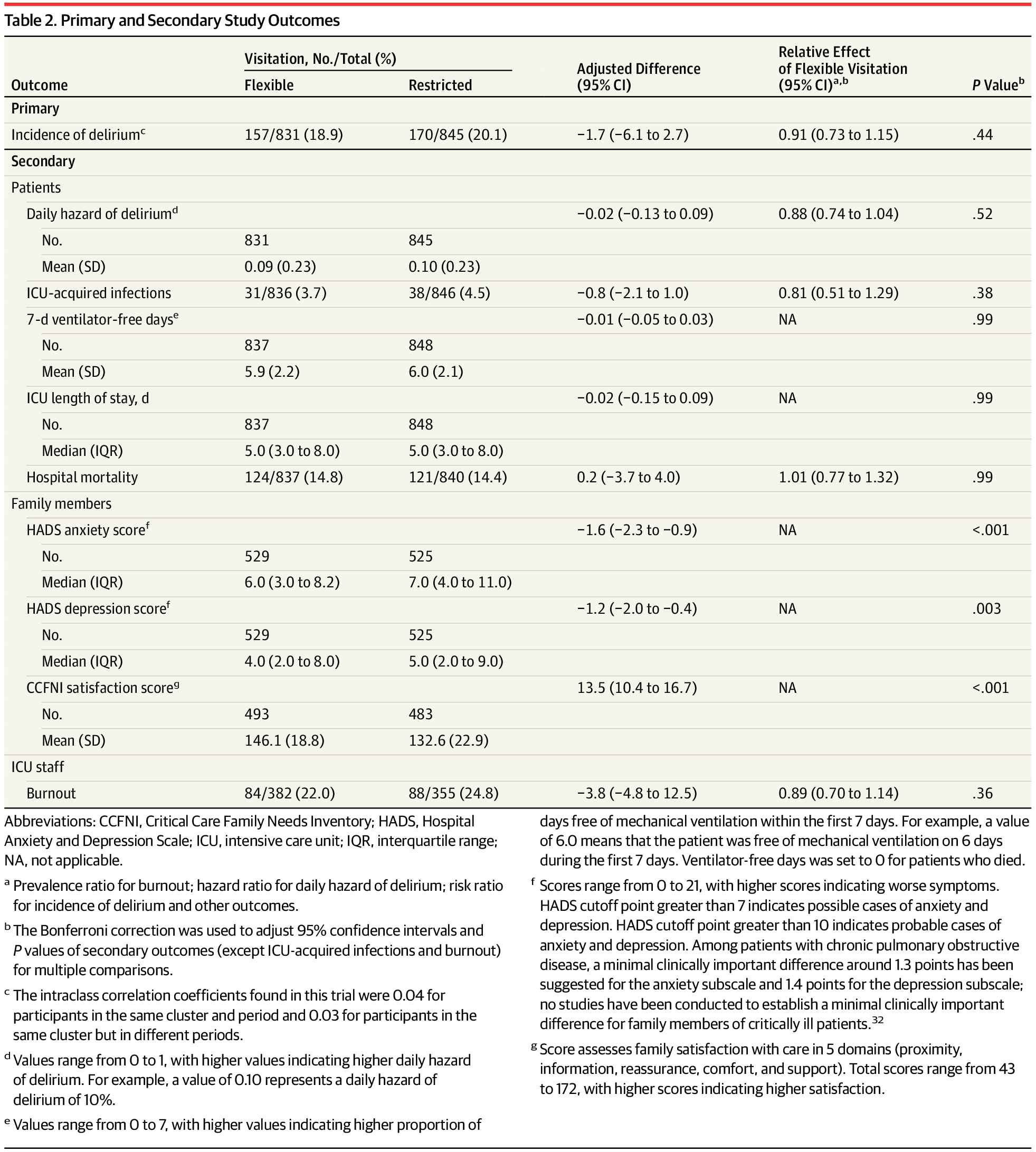Original Investigation | Caring for the Critically Ill Patient
Effect of Flexible Family Visitation on Delirium Among Patients in the Intensive Care Unit: The ICU Visits Randomized Clinical Trial
Regis Goulart Rosa, Maicon Falavigna, Daiana Barbosa da Silva, et al
JAMA. 2019;322(3):216-228. doi:10.1001/jama.2019.8766
Abstract
Importance 背景
The effects of intensive care unit (ICU) visiting hours remain uncertain.
ICU访视时间的影响并不确定。
Objective 目的
To determine whether a flexible family visitation policy in the ICU reduces the incidence of delirium.
确定ICU患者家属弹性访视政策是否能够降低谵妄发生率
Design, Setting and Participants 设计,场景及研究对象
Cluster-crossover randomized clinical trial involving patients, family members, and clinicians from 36 adult ICUs with restricted visiting hours (<4.5 hours per day) in Brazil. Participants were recruited from April 2017 to June 2018, with follow-up until July 2018.
在巴西36个限制访视时间(每天< 4.5小时)的成人ICU进行的群组交叉随机临床试验,纳入患者、家属及临床医生。从2017年4月至2018年6月入选,最后随访日期为2018年7月。
Interventions 干预措施
Flexible visitation (up to 12 hours per day) supported by family education (n = 837 patients, 652 family members, and 435 clinicians) or usual restricted visitation (median, 1.5 hours per day; n = 848 patients, 643 family members, and 391 clinicians). Nineteen ICUs started with flexible visitation, and 17 started with restricted visitation.
弹性访视时间(每天不超过12小时)辅助以家属宣教(n = 837 名患者,652 名家属,以及435 名医务人员)或常规限制访视时间(中位数,每天1.5 小时;n = 848 名患者,643 名家属和 391 名医务人员)。
Main Outcomes and Measures 主要预后指标
Primary outcome was incidence of delirium during ICU stay, assessed using the CAM-ICU. Secondary outcomes included ICU-acquired infections for patients; symptoms of anxiety and depression assessed using the HADS (range, 0 [best] to 21 [worst]) for family members; and burnout for ICU staff (Maslach Burnout Inventory).
主要预后指标为ICU住院期间谵妄发生率,通过CAM-ICU进行评估。次要预后指标包括ICU获得性感染(患者);采用HADS(范围 0 [最佳] - 21 [最差])评估的焦虑和抑郁症状(家属);以及ICU医务人员倦怠(Maslch倦怠量表)。
Results 结果
Among 1685 patients, 1295 family members, and 826 clinicians enrolled, 1685 patients (100%) (mean age, 58.5 years; 47.2% women), 1060 family members (81.8%) (mean age, 45.2 years; 70.3% women), and 737 clinicians (89.2%) (mean age, 35.5 years; 72.9% women) completed the trial. The mean daily duration of visits was significantly higher with flexible visitation (4.8 vs 1.4 hours; adjusted difference, 3.4 hours [95% CI, 2.8 to 3.9]; P < .001). The incidence of delirium during ICU stay was not significantly different between flexible and restricted visitation (18.9% vs 20.1%; adjusted difference, −1.7% [95% CI, −6.1% to 2.7%]; P = .44). Among 9 prespecified secondary outcomes, 6 did not differ significantly between flexible and restricted visitation, including ICU-acquired infections (3.7% vs 4.5%; adjusted difference, −0.8% [95% CI, −2.1% to 1.0%]; P = .38) and staff burnout (22.0% vs 24.8%; adjusted difference, −3.8% [95% CI, −4.8% to 12.5%]; P = .36). For family members, median anxiety (6.0 vs 7.0; adjusted difference, −1.6 [95% CI, −2.3 to −0.9]; P < .001) and depression scores (4.0 vs 5.0; adjusted difference, −1.2 [95% CI, −2.0 to −0.4]; P = .003) were significantly better with flexible visitation.
总共 1685 名患者,1295 名家属以及 826 名医务人员入选,1685 名患者 (100%)(平均年龄,58.5 岁;47.2% 女性),1060 名家属 (81.8%)(平均年龄,45.2 岁;70.3% 女性),以及 737 名医务人员 (89.2%)(平均年龄,35.5 岁;72.9% 女性)完成试验。弹性访视组每天平均访视时间显著演唱(4.8 vs 1.4 小时;校正后差异,3.4 小时 [95% CI, 2.8 to 3.9]; P < .001)。弹性访视组与限制访视组患者ICU住院期间谵妄发生率无显著差异(18.9% vs 20.1%;校正后差异,−1.7% [95% CI, −6.1% to 2.7%]; P = .44)。在9个预先确定的次要预后指标中,6项指标在两组间没有显著差异,包括ICU获得性感染(3.7% vs 4.5%;校正后差异,−0.8% [95% CI, −2.1% to 1.0%]; P = .38)和医务人员倦怠(22.0% vs 24.8%;校正后差异,−3.8% [95% CI, −4.8% to 12.5%]; P = .36)。对于家属而言,弹性访视组焦虑中位评分(6.0 vs 7.0;校正后差异,−1.6 [95% CI, −2.3 to −0.9]; P < .001)及抑郁中位评分(4.0 vs 5.0;校正后差异,−1.2 [95% CI, −2.0 to −0.4]; P = .003)显著优于限制访视组。







Conclusions and Relevance 结论与意义
Among patients in the ICU, a flexible family visitation policy, vs standard restricted visiting hours, did not significantly reduce the incidence of delirium.
对于ICU患者,与标准的限制访视时间相比,家属弹性访视政策并不显著减少谵妄发生率。
Trial Registration 试验注册
ClinicalTrials.gov Identifier: NCT02932358
评论[仅代表个人观点]
- 恐怕需要首先了解引起谵妄最重要的因素是什么(或许存在地域差异),再讨论弹性访视政策能否改善谵妄
- 人文话题从来不是国内重症医学界关注的话题。这一点我们真的对吗?